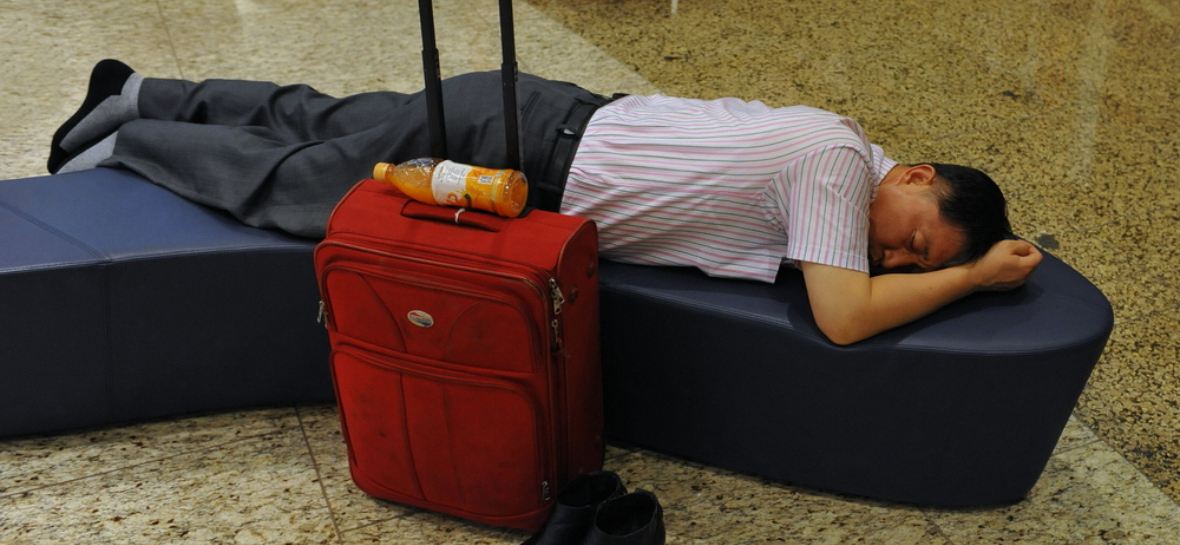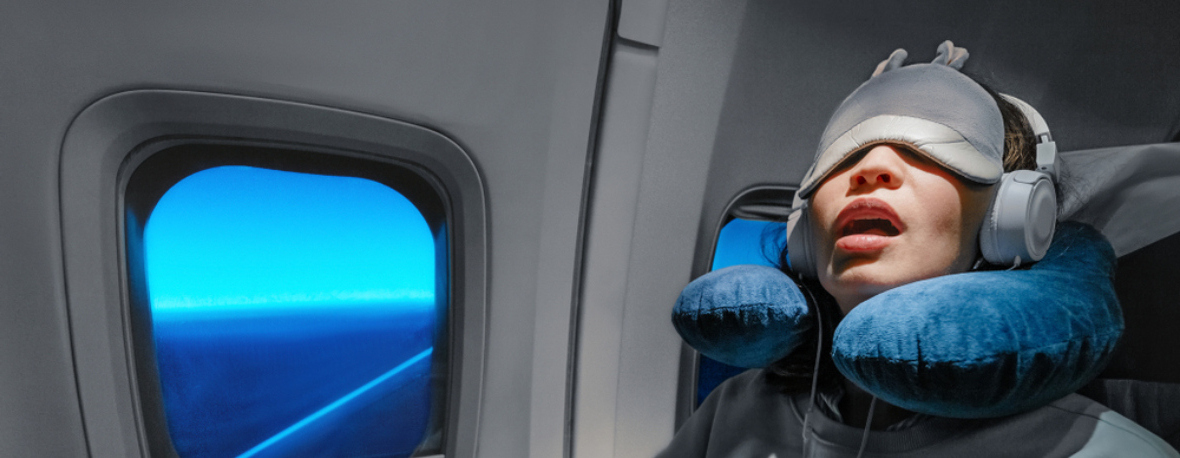How to Beat Jet Lag , Remedies, and Prevention Strategies
Last updated:
Published:
Jet lag is a common yet often misunderstood phenomenon experienced by many travelers. In this comprehensive guide, we will delve into the intricacies of jet lag, exploring its causes and symptoms to help you better understand how it affects your body's internal clock.
Contents:
We will discuss various strategies for avoiding and beating jet lag, from pre-travel preparation tips to sleep hygiene practices. Furthermore, we'll explore preventative measures such as adjusting your sleep schedule before traveling and maintaining healthy eating habits.
Finally, learn how to effectively deal with jet lag after arrival through hydration and exercise techniques. We'll also cover natural remedies for relief and managing long-term effects on both mental and physical health. By understanding these key aspects of jet lag management, you can ensure a smoother transition between time zones while minimizing travel fatigue.
What is Jet Lag?
Jet lag, also known as time zone change syndrome or desynchronosis, is a temporary sleep disorder that occurs when your body's internal clock becomes misaligned with the local time at your destination. This can cause various symptoms and discomforts, which we will discuss in this section.

Definition of Jet Lag
Jet lag occurs when you travel across multiple time zones quickly, such as on long-haul flights. Your internal clock, the circadian rhythm, oversees numerous bodily functions like wake-sleep cycles, hormone production and digestion. When you cross different time zones rapidly, it takes some time for your circadian rhythm to adjust to the new environment.
Symptoms of Jet Lag
The severity and duration of jet lag symptoms vary from person to person but generally include:
- Fatigue during daytime hours
- Trouble falling asleep or staying asleep at night
- Digestive issues such as constipation or diarrhea
- Mood changes like irritability or anxiety
- Poor concentration and memory lapses
Causes of Jet Lag
The primary cause of jet lag is rapid travel across multiple time zones leading to a disruption in your body's natural circadian rhythm. Other factors that contribute to jet lag include:
- Sunlight's role in keeping our circadian rhythms functioning properly can be disrupted by a lack of exposure to it, which can worsen jet lag symptoms.
- Dehydration: Air travel, especially long-haul flights, can cause dehydration due to low humidity levels in airplane cabins. Dehydration may worsen the effects of jet lag on your body.
- Alcohol and caffeine consumption: Both alcohol and caffeine can disrupt sleep patterns and contribute to increased jet lag symptoms.
In the following sections, we will discuss various strategies for avoiding, beating, preventing, and dealing with jet lag effectively so that you can enjoy a more comfortable journey when traveling across time zones.
Jet lag can lead to exhaustion, confusion, and sleep deprivation. To avoid jet lag, it's important to understand the causes of this condition and take steps before and during your travels.
How to Avoid Jet Lag
Preventing jet lag is always preferable to dealing with its effects. By taking some proactive steps before and during your travel, you can minimize the impact of jet lag on your body and mind. Here are some tips that will help you avoid jet lag:
Pre-Travel Preparation Tips
- Gradually adjust your sleep schedule: Start shifting your bedtime closer to the destination's time zone a few days before departure. Begin transitioning your sleep schedule in advance to ease the transition when you arrive.
- Maintain good sleep hygiene: Ensure that you get quality sleep in the days leading up to your trip by following proper sleep hygiene practices.
- Eat well-balanced meals: Consuming nutritious food prior to traveling helps keep energy levels stable and supports overall health.
- Avoid caffeine and alcohol close to bedtime: These substances can interfere with sleep quality, making it harder for your body clock to adjust.
During Travel Tips
- Synchronize with destination time as soon as possible:To help reset your internal clock more quickly, set all devices (watches, phones) accordingto the local time atyourdestinationas soon asyou boardthe plane. li >
- Stayhydrated : strong > Drinking plentyof water throughouttheflightwillhelp combatdehydrationcausedby airtravel .Avoid excessivecaffeineandalcoholintake , astheycontributetodehydrationandcanexacerbatejetlag . li >
- Getupandmove : strong > Regularlystretchingandwalkingaroundthecabinwillpromotebloodcirculation , helpingtoreducefatigue . li >
- Sleepstrategicallyontheplane : strong > Ifyou 're traveling east, try to sleep during the latter part of your flight. If you're heading west, stay awake for most of the journey and sleep towards the end.
By following these pre-travel preparation tips and in-flight strategies, you can significantly reduce your chances of experiencing jet lag and enjoy a smoother transition into your new time zone.
By applying the advice in this article, one can take measures to prevent jet lag. However, if you find yourself still struggling with symptoms of jet lag after your travels, there are some strategies that may help reduce its effects.

How to Beat Jet Lag
If you're already experiencing jet lag, don't worry. There are several strategies that can help you overcome it and get back on track. In this section, we'll discuss some effective light exposure and sleep hygiene techniques that will assist in beating jet lag.
Light Exposure Strategies
Exposure to natural light is essential for realigning one's internal clock. Here are a few tips for managing your light exposure:
- Morning Light: If you've traveled eastward, expose yourself to bright morning sunlight as soon as possible after waking up. This helps advance your body's internal clock and adjust to the new time zone faster.
- Avoid Evening Light: Conversely, if you've traveled westward, try to avoid evening sunlight by staying indoors or wearing sunglasses when outside during late afternoon hours.
- Daily Routine: Establish a consistent daily routine with regular outdoor activities during daylight hours so that your body gets used to the new schedule more quickly.
Sleep Hygiene Strategies
In addition to managing light exposure, maintaining good sleep hygiene is crucial for overcoming jet lag. Here are some helpful tips for improving sleep quality while adjusting to a new time zone:
- Create a Sleep-Friendly Environment: Your sleeping area should be dark, quiet, cool (between 60-67°F /15-19°C recommended by Sleep Foundation) and comfortable. Use blackout curtains or an eye mask if necessary.
- Avoid Stimulants: Caffeine and nicotine can interfere with your ability to fall asleep. Abstain from caffeine and nicotine for 4-6 hours prior to going to sleep.
- Establish a Bedtime Routine: Create a relaxing pre-sleep routine that signals your body it's time for bed, such as reading or taking a warm bath.
- Melatonin Supplements: Melatonin, a hormone responsible for regulating sleep-wake cycles, can be taken in supplement form to help adjust your internal clock when traveling across time zones. Consult with your healthcare provider before using melatonin supplements.
By incorporating these light exposure and sleep hygiene strategies into your daily routine, you'll be well on your way to beating jet lag and enjoying the most of every moment during your travels.
By utilizing the tactics laid out in this piece, you can overcome jet lag and restore your energy. Now that we've discussed how to beat jet lag, let's move on to prevention techniques for reducing its effects before it even starts.
How to Prevent Jet Lag
Preventing jet lag is crucial for maintaining your overall well-being and enjoying your trip to the fullest. To minimize jet lag's effect, proactively take steps before and during your journey.
Adjusting Your Sleep Schedule Before Traveling
To prevent jet lag, it's essential to start adjusting your sleep schedule a few days before departure. Gradually shift bedtime and wake-up times closer to those at your destination:
- If traveling eastward, go to bed earlier each night leading up to the trip.
- If traveling westward, stay awake later each night prior to departure.
This gradual adjustment helps synchronize your internal clock with local time at the destination, making it easier for you to adapt once you arrive. Additionally, try practicing good sleep hygiene by creating a relaxing bedtime routine and ensuring an optimal sleeping environment in terms of temperature, noise levels, and lighting conditions.
Eating Habits and Nutrition for Jet Lag Prevention
Your eating habits also play a significant role in preventing jet lag. A balanced diet rich in nutrients can help support healthy sleep patterns while providing energy throughout the day:
- Maintain regular meal times: Eating meals at consistent intervals helps regulate circadian rhythms that influence digestion as well as sleep-wake cycles.
- Avoid heavy or spicy foods close to bedtime: Consuming large or spicy meals within three hours of going bed may lead discomfort or indigestion that disrupts restful slumber. Sleep Foundation recommends lighter, easily digestible meals in the evening.
- Stay hydrated: Dehydration can exacerbate jet lag symptoms. Drink lots of H2O prior to, while on, and after your journey. Avoid excessive caffeine or alcohol consumption as they may contribute to dehydration and disrupt sleep patterns.
- Incorporate nutrient-rich foods: Consume a diet rich in vitamins B6 and B12, magnesium, and melatonin - all known for their roles in promoting healthy sleep cycles. Foods such as bananas, almonds, spinach, fish like salmon or tuna are excellent sources of these nutrients. Healthline
Taking proactive measures with your sleep schedule and eating habits will help prevent jet lag from taking hold when you travel across time zones. By following these strategies consistently before departure and during your trip,Cibdol CBD oil products , can provide additional support by promoting relaxation while helping regulate sleep-wake cycles.
Jet lag can be prevented by adjusting your sleep schedule before traveling and eating habits that are conducive to jet lag prevention. Once you've arrived, there are various approaches to help manage jet lag, like hydrating and exercising which can aid in faster recuperation.
How to Deal with Jet Lag After Arrival
Once you've reached your destination, taking steps to combat jet lag and help your body adjust can be essential. The following strategies can assist in overcoming jet lag symptoms:
a. Hydration Strategies for Dealing with Jet Lag
- Maintain hydration levels: Drinking plenty of water is crucial when dealing with jet lag, as dehydration can worsen its effects. Aim for at least eight glasses of water per day.
- Avoid caffeine and alcohol: Both caffeine and alcohol can dehydrate the body and disrupt sleep patterns, making it harder to recover from jet lag. Opt for herbal teas or other non-caffeinated beverages instead.
- Eat hydrating foods: Consuming fruits and vegetables high in water content, such as cucumbers, melons, oranges, or strawberries will help keep you hydrated throughout the day.
b. Exercise Strategies for Dealing with Jet Lag
- Schedule light exercise sessions: Engaging in light physical activity like walking or stretching after arrival helps reset your internal clock by promoting blood circulation and oxygen flow through the body.
- (source).
- Avoid heavy workouts initially: If you are a fitness enthusiast who loves working out regularly even while traveling; avoid engaging in intense workout sessions right after landing because they might exacerbate fatigue caused due to long hours spent on flight travel.
- Incorporate outdoor activities: Exposure to natural sunlight helps regulate your body's circadian rhythm, which is essential for adjusting to a new time zone. Plan some outdoor activities like sightseeing or hiking during daylight hours.
By following these hydration and exercise strategies, you can effectively deal with jet lag after arrival and ensure a smoother transition into your new time zone. Remember that it may take several days for your body to fully adjust, so be patient and give yourself the necessary time to recover.

Frequently Asked Questions Jet Lag
What is the main cause of jet lag?
This disruption leads to a misalignment between our internal clock and the external environment, causing symptoms such as fatigue, insomnia, and difficulty concentrating. Research suggests that it takes about one day per time zone crossed for our bodies to adjust.
What are 5 symptoms of jet lag?
- Fatigue and general tiredness
- Insomnia or disturbed sleep patterns
- Digestive issues like constipation or diarrhea
- Mood changes such as irritability or mild depression
- Cognitive difficulties including trouble concentrating and memory problems
How many days will jet lag last?
The duration of jet lag varies depending on factors like individual sensitivity, number of time zones crossed, and direction traveled. Generally speaking, it takes approximately one day per time zone crossed for your body to fully adjust. For example, if you cross six-time zones during your trip, expect around six days for recovery.
Is jet lag worse going east or west?
Jet lag tends to be worse when traveling eastward, because it requires advancing (shortening) the circadian rhythm rather than delaying (lengthening) it - which is more challenging for most people. Traveling westward generally aligns better with our natural tendency to have a slightly longer than 24-hour internal clock.
Conclusion
Jet lag can be a difficult experience for travelers, but there are ways to reduce its effects. Taking measures such as avoiding caffeine and alcohol before travel, setting your watch to the local time at your destination ahead of arrival, and getting plenty of rest during the flight can help you beat jet lag quickly when you arrive. Staying hydrated is essential for minimizing jet lag's effects and ensuring a smooth transition to the local time zone. With these tips in mind, travelers should have no problem dealing with any negative impacts from jetlag.
- Disclaimer:
- This article has been written for informational purposes only, and is based on research published by other externals sources




















